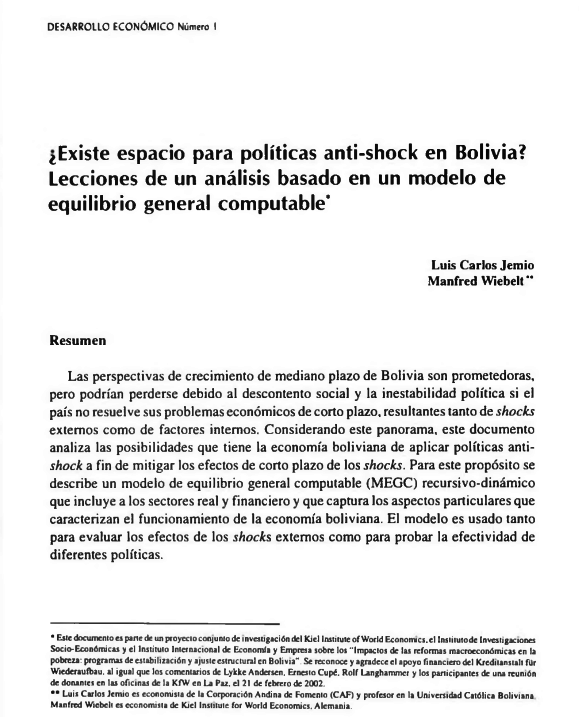Is there space for anti-shock policies in Bolivia?: Lessons from an analysis based on a computable general equilibrium model.
DOI:
https://doi.org/10.35319/lajed.20031336Keywords:
Bolivian economy, Shocks, CGEM, Economic growthAbstract
Bolivia's medium-term growth prospects are promising, but they could be lost due to social unrest and political instability if the country does not solve its short-term economic problems, resulting both from external shocks and internal factors. Considering this scenario, this document analyzes the possibilities of the Bolivian economy to apply anti-shock policies in order to mitigate the short-term effects of the shocks. For this purpose, a recursive-dynamic computable general equilibrium (CGEM) model is described that includes the real and financial sectors and captures the particular aspects that characterize the functioning of the Bolivian economy. The model is used both to evaluate the effects of external shocks and to test the effectiveness of different policies.Downloads
References
Andersen, L.E. y R. Faris. 2001. “Reducing Volatility due to Natural Gas Exports: Is the Answer a Stabilization Fund?” . Instituto de Investigaciones Socio-Económicas. Universidad Católica Boliviana. La Paz. Documento de Trabajo N° 11/2001.
Andersen, L.E. y M. Meza. 2001. “The Natural Gas Sector in Bolivia: An Overview” Instituto de Investigaciones Socio-Económicas. Universidad Católica Boliviana. La Paz. Documento de Trabajo N° 1/2001.
Andersen, L.E. y O. Nina. 2000. “The HIPC Initiative in Bolivia”. Instituto de Investigaciones Socio-Económicas. Universidad Católica Boliviana. La Paz. Documento de Trabajo N° 4/ 2000.
Banco Central de Bolivia. 2001. Macroeconómicamente ajustado: una aplicación para el caso boliviano en el periodo 1990-2000. Asesoría de Política Económica. Banco Central de Bolivia. La Paz.
Bourguignon, F, W. Branson y J. de Melo. 1989. “Adjustment and Income Distribution: A Counterfactual Analysis” NBER National Bureau of Economic Research, Cambridge, MA. Working Paper N° 2943.
CEPAL, ONU, UCB. 2000. Quince años de reformas estructurales en Bolivia: sus impactos sobre inversión, equidad y crecimiento. La Paz.
Cupé, E. 2002. “Tipo de cambio y su efecto sobre inflación y precio relativos internos: evidencia empírica.” Revista de Análisis Económico (forthcoming).
Gobierno de Bolivia. 2001. “Poverty Reduction Strategy”. Gobierno de Bolivia. La Paz. Working Paper.
IMF. 2001. IMF and World Bank Support US$ 1.2 Billion in Additional Debt Service Relief for Bolivia under Enhanced HIPC (http://www.imf.org/external/np/sec/pr/2001/pr0129.htm).
Jemio, L.C. 1993. Micro and Macroeconomic Adjustment in Bolivia (1970-89). A Neostructuralist Analysis o f External Shocks, Adjustment and Stabilization Policies. Institute of Social Studies. The Hague.
Jemio, L.C. 2001a. Debt, Crisis and Reform. Biting the Bullet. Basingstoke, Hampshire.
Jemio, L.C. 2001b.“ Macroeconomic Adjustment in Bolivia since the 1970s: Adjustment to What, By Whom, and How? Analytical Insights from a SAM Model”. Kiel. The Kiel Institute of World Economics. Kiel. Working Paper N° 1031.
Jemio, L.C. y M. Wiebelt. 2002. “Macroeconomic Impacts of External Shocks and Anti-Shock in Bolivia: A CGE Analysis”. Kiel Institute for World Economics. Kiel. Working Paper N° 1100.
Orellana, W. y C.T. Mollinedo. 1999.“Percepción de riesgo, dolarización y política monetaria en Bolivia”. Revista de Análisis, Vol. 2(1).
Rosenzweig, J.A. y L. Taylor. 1990. “Devaluation, Capital Flows, and Crowding-Out: A CGE Model with Portfolio Choice for Thailand”. En L. Taylor (ed.), Socially Relevant Policy Analysis. Structuralist Computable General Equilibrium Models fo r the Developing World. Cambridge, Mass.
Schweickert, R. 2001. “Macroeconomic Constraints on Economic Development and Poverty Reduction: The Case of Bolivia”. The Kiel Institute of World Economics. Kiel. Working Paper 1060.
Taylor, L. 1990. “Structuralist CGE Models”. En L. Taylor (ed.), Socially Relevant Policy Analysis. Structuralist Computable General Equilibrium Models fo r the Developing World. Cambridge. Mass.
Thiele, R. y D. Piazolo. 2002. "Constructing a Social Accounting Matrix with a Distributional Focus. The Case of Bolivia”. The Kiel Institute of World Economics. Kiel. Working Paper N° 1094.
Unidad de Análisis de Políticas Económicas (UDAPE). 2001. Dossier de estadísticas sociales y económicas de Bolivia. Vol. 11, CD-ROM. Unidad de Análisis de Políticas y Económicas, Ministerio de Hacienda. La Paz.
Wiebelt, M. 1996. Anpassung und Einkommensverteilung in Entwicklungs-ländern. Eine angewandte allgemeine Gleichgewichtsanalyse für Malaysia. Kieler Studien 276. Tübingen.






